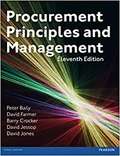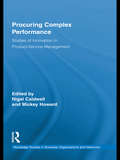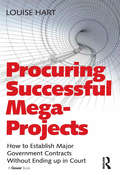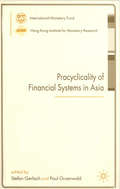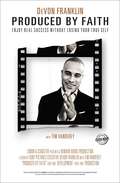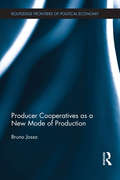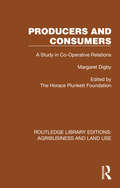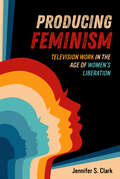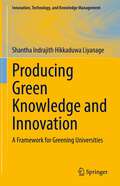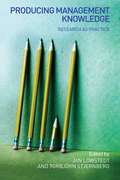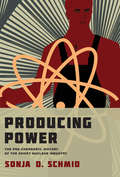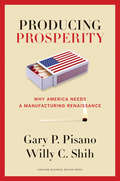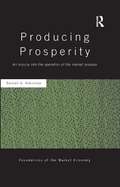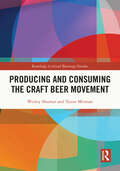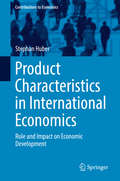- Table View
- List View
Procurement, Principles and Management
by David Jones Peter Baily Barry Crocker David Farmer David JessopNow in its eleventh edition, Procurement Principles and Management has been essential reading for practitioners and students of purchasing and procurement for nearly 50 years. This new edition will provide the reader with a reflection of mainstream practice alongside insight into developing ideas and approaches. This book has been updated to cover the continuous change and development in the field of purchasing, and carefully balances emerging philosophies with proven and established thinking and practice in the profession.
Procuring Complex Performance: Studies of Innovation in Product-Service Management (Routledge Studies in Business Organizations and Networks)
by Nigel CaldwellThis book examines the management of Procuring Complex Performance (PCP) in large-scale programmes that includes the downstream support phase in sectors such as construction, healthcare, transport, aerospace, marine and defence. It brings together a series of edited chapters to explain why the traditional combination of linear project management and highly detailed contracts are now unsuited to the dynamics of emerging customer requirements based on performance and outcome. Working with leading business professors across the UK and Europe, Caldwell and Howard present the case for why large-scale programmes of world class organizations often represent a shifting frontier between the boundaries of public-private provision and silos of operations expertise. Adopting a procurement perspective, the authors explain how complex performance means not just coping with the dynamics of buyer-supplier relationships, but incorporates the shift from production orientation towards availability of bundled services such as maintenance and upgrade delivered over extended, often multi-decade timeframes. The strength of ‘PCP’ is its empirical case-based support for new business models based on through-life management, availability contracting and service support which challenge simplistic notions of dyadic, hierarchical relationships and transfer of risk to the supply base. This unique publication is essential reading for scholars and practitioners seeking to understand the context of innovation and supply as a coordinated and integrated approach to managing and procuring complex performance.
Procuring Successful Mega-Projects: How to Establish Major Government Contracts Without Ending up in Court
by Louise HartMega-projects descending into chaos and litigation embarrass governments all over the world, as the public sector presides over fiascos that waste billions and destroy reputations. Inquiry after Inquiry finds the damaging and costly failures of major government projects can be traced back to the contract establishment process. Procuring Successful Mega-Projects, is a mentor’s guide for project directors, providing frank, fearless, practical advice on how to set up a major government contract that won’t end up in court. It’s all there: How to develop and negotiate a contract that doesn’t contain undeliverable obligations or perverse incentives but does contain the necessary provisions for successful project management. How to navigate the pitfalls of the public sector environment, from hiring freezes and governance frameworks to the complexities of managing the relationship with the Minister. How to select and manage the lawyers and other advisers, build the adviser-client relationship and recognise that unwelcome advice may not be unhelpful. How to structure and follow a bullet-proof procurement process that is fair to bidders and delivers great outcomes. Procuring Successful Mega-Projects is essential reading, not just for the project director, but for everyone with a stake in the success of a mega-project: public sector executives; Ministers; private sector tenderers; infrastructure lenders; legal, financial and technical professional service providers; and procurement and project management professionals.
Procyclicality and Fair Value Accounting
by Juan Solé Alicia Novoa Jodi ScarlataA report from the International Monetary Fund.
Procyclicality in Central Bank Reserve Management: Evidence from the Crisis
by Jukka Pihlman Han van der HoornA report from the International Monetary Fund.
Procyclicality of Financial Systems in Asia
by Paul Gmenwald Stefan GerlachA report from the International Monetary Fund.
Prodigy Network: Democratizing Real Estate Design and Financing
by Karim R. Lakhani Greta Friar Katja HutterThis case follows Rodrigo Nino, founder and CEO of commercial real estate development company Prodigy Network, as he develops an equity-based crowdfunding model for small investors to access commercial real estate in Colombia, then tries out the model in the U.S. U.S. regulations, starting with the Securities Act of 1933, effectively barred sponsors from soliciting small investors for large commercial real estate. However, the JOBS Act of 2013 loosened U.S. restrictions on equity crowdfunding. Nino believes that crowdfunding will democratize real estate development by providing a new asset class for small investors, revolutionizing the industry. The case also follows Nino's development of an online platform to crowdsource design for his crowdfunded buildings, maximizing shared value throughout the development process. Nino faces many challenges as he attempts to crowdfund an extended stay hotel in Manhattan, New York. For example, crowdfunded real estate faces resistance from industry leaders, especially in regards to the concern of fraud, and SEC regulations on crowdfunding remain undetermined at the time of the case.
Produced by Faith: Enjoy Real Success without Losing Your True Self
by Tim Vandehey Devon FranklinSTRAIGHT FROM HOLLYWOOD comes a dynamic business model for building a thriving career without compromising your faith. DeVon Franklin, vice president of production for Columbia Pictures, shares how being bold about his Christian faith while being driven and ambitious has actually helped him to excel in a high-profile, fast-paced, competitive industry. You are the movie. Produced by Faith parallels each step of the Hollywood filmmaking process with the faith-making process God uses to turn your career into a success. You will discover that it is possible to be both wildly successful and completely committed to God--and that you will be even more successful when you place your faith at the center of your career. You can unleash the power of your faith as your greatest professional advantage and use the compass of God's Word to guide you to your true passion and purpose in life. In this informative, inspiring book, DeVon reveals the secrets to maintaining your faith while advancing in your career. Here he shows you: * How to discover The Big Idea for your life * How to take your career to the next level * How to recognize the signs God sends you that indicate when it's time to move in a new direction * How to stand firm on your Christian principles without compromise * How to work with people who don't understand your beliefs * How to choose a profession, industry, or company that is in tune with your purpose DeVon says, "I know from my own experiences that if you will put your career in God's hands and trust him, you can't account for all the ways he will bless you. When you step out in faith, he will open doors and bring you opportunities that will surpass even your wildest expectations. . . . If I have learned anything, it's this: to get where you want to go, you first have to become the person God wants you to be."
Producer Cooperatives as a New Mode of Production: Producer Cooperatives As A New Mode Of Production (Routledge Frontiers of Political Economy)
by Bruno JossaThe notion that there is no alternative to capitalism emerged after the fall of the Berlin Wall and made rapid headway due to increasing economic globalisation. More recently, this belief that there is no viable alternative has held firm despite the financial crisis, high unemployment levels and an ever-increasing gap between rich and poor. However, since the appearance of Benjamin Ward’s seminal 1958 article, economic theorists have been developing a workable alternative: a system of self-managed firms. The core argument outlined in this book is that a well-organised system of producer cooperatives would give rise to a new mode of production and, ultimately, a genuinely socialist society. This argument is developed through three key steps. First, following on from Jaroslav Vanek’s definition, it is argued that a ‘Labour-Managed Firm’, a firm which strictly segregates capital incomes from labour incomes, would implement a new production mode because it would reverse the pre-existing relation between capital and labour. Second, given that a system of these ‘Labour-Managed Firm’ cooperatives would reverse the capital-labour relationship, it is suggested that this would constitute a form of market socialism. Third, it is argued that compared to capitalism a system of producer cooperatives offers a wealth of advantages, including the potential for efficiency gains, the eradication of unemployment and the end of exploitation. Ultimately, this book concludes that self-management could take the place of central planning in Marxist visions for the future.
Producer Services in China: Economic and Urban Development (Routledge Studies in Human Geography)
by Anthony G.O. Yeh Fiona F. YangIn the past three decades, China has experienced an unprecedented pace of economic and urban development. It’s economy is now transforming from one based on manufacturing industries towards the producer services, with the importance of these services in the national and regional economy being recognized by economists and policy makers alike. With growing demand and policy support, producer services are expected to expand rapidly, leading to a new wave of economic and urban development in China. This groundbreaking volume is one of the first to address questions related to the development of these services in China. The contributions explore a wide range of associated topics including the characteristics of the growth of producer services and how this is related to China’s economic and urban transition, the distribution of these services amongst Chinese cities, as well as drawing comparison between producer service development in China and Western counterparts. This volume also discusses the dynamics of the development of these services in China and how the political-economic embeddedness of China has shaped the development of producer services. Finally, the consequences of this growth and how the economy and urban space have change in response is explored, as well as the challenges Chinese cities face in moving towards a service economy, and how this can inform future public policies. This volume addresses the pressing need to understand the economic and urban changes in post-industrial China to allow appropriate strategies and policies to formulated to facilitate future development in China. The text is rich with statistical data and diagrams, providing original contributions and a cutting edge overview. This timely publication will be of interest to upper-level undergraduates, postgraduates, and researchers interested in China, Urban Studies and Economic Development.
Producers and Consumers: A Study in Co-Operative Relations (Routledge Library Editions: Agribusiness and Land Use #6)
by Margaret DigbyAlthough originally published in 1928, many of the issues discussed in this book remain pertinent today: in unstable markets grappling with labour shortages, how to pay the producers of food a fair price, at a price the consumer can afford, whilst maximising efficiency and minimising waste. Against this backdrop, the book discusses co-operative movements from the UK, Denmark, New Zealand, the former USSR and the USA.
Producing Feminism: Television Work in the Age of Women's Liberation (Feminist Media Histories #6)
by Jennifer S. ClarkA free ebook version of this title is available through Luminos, University of California Press's Open Access publishing program. Visit www.luminosoa.org to learn more. In this deeply archival work, Jennifer S. Clark explores the multiple ways in which women's labor in the American television industry of the 1970s furthered feminist ends. Carefully crafted around an impressive assemblage of interviews and primary sources (from television network memos to programming schedules, production notes to executive meeting agendas), Clark tells the story of how women organized in the workplace to form collectives, affect production labor, and develop reform-oriented policies and philosophies that reshaped television behind the screen. She urges us to consider how interventions, often at localized levels, can collectively shift the dynamics of a workplace and the cultural products created there.
Producing Graphic Media for Sports: New Horizons and Possibilities for the Motion Media Specialist
by John S. ZaffutoProducing Graphic Media for Sports: New Horizons and Possibilities for the Motion Media Specialist explores the origins, applications, and future of the production of sports-oriented motion graphics. Beginning with the evolution and development of sports-oriented art and design, this book investigates the importance of motion graphics within a variety of environments in the sphere of organized, competitive activity. Venue-based presentation, broadcast and streaming environments, and the importance of graphic standards and brand guidelines are all discussed in detail, along with applications within social media and mobile platforms. A final chapter on emerging technologies covers the potential use of motion media for e-sports and other trending developments within the sports world. The author draws on case studies and interviews with sports media professionals to augment his own research and observation of trends and processes and to highlight the exciting career opportunities that exist within the sports presentation and marketing industries. This book is recommended reading for students of advanced media production, sports marketing, and media production for advertising.
Producing Green Knowledge and Innovation: A Framework for Greening Universities (Innovation, Technology, and Knowledge Management)
by Shantha Indrajith LiyanageThe knowledge and innovation meant for knowledge-based economies (KBEs) are branded as green knowledge and innovation/ethical human capital, blended with the natural system as modeled by the Quintuple Helix Model of Innovation. However, due to bureaucratic challenges and myths, conventional universities produce knowledge and innovation in the sense of traditional disciplinary knowledge, which are not adequate to meet the goals of sustainable development.This book provides a model for greening a university which in turn can produce green knowledge and innovation in the mainstream knowledge production process. This model, which is based on research, can be adopted by the conventional universities in other regions. Such a process results in providing benefits to stakeholders of the university at the micro-level. At the macro-level, it blends with the other knowledge systems—namely, the natural environment of society, economic system, media-based and culture-based public and civil society, and political system—to create a sustainable knowledge economy.
Producing Management Knowledge: Research as practice
by Jan Löwstedt Torbjörn StjernbergProviding readers with a unique insight into conducting research, this exciting book describes the thought and work processes of researchers as they complete their projects. Engaging and accessible it investigates all the key aspects of this topic and advice on how to conduct interviews, study the everyday life of an organization, and many other standard methods of conducting research. This is not a prescriptive methodology textbook, rather it explores how to approach, think and act in interaction with the empirical field. Comprehensive and accessible, this thought-provoking text shows readers how to develop management investigations skills, and will be invaluable for final year undergraduates, masters and PhD students.
Producing Power: The Pre-Chernobyl History of the Soviet Nuclear Industry (Inside Technology)
by Sonja D. SchmidAn examination of how the technical choices, social hierarchies, economic structures, and political dynamics shaped the Soviet nuclear industry leading up to Chernobyl.The Chernobyl disaster has been variously ascribed to human error, reactor design flaws, and industry mismanagement. Six former Chernobyl employees were convicted of criminal negligence; they defended themselves by pointing to reactor design issues. Other observers blamed the Soviet style of ideologically driven economic and industrial management. In Producing Power, Sonja Schmid draws on interviews with veterans of the Soviet nuclear industry and extensive research in Russian archives as she examines these alternate accounts. Rather than pursue one “definitive” explanation, she investigates how each of these narratives makes sense in its own way and demonstrates that each implies adherence to a particular set of ideas—about high-risk technologies, human-machine interactions, organizational methods for ensuring safety and productivity, and even about the legitimacy of the Soviet state. She also shows how these attitudes shaped, and were shaped by, the Soviet nuclear industry from its very beginnings.Schmid explains that Soviet experts established nuclear power as a driving force of social, not just technical, progress. She examines the Soviet nuclear industry's dual origins in weapons and electrification programs, and she traces the emergence of nuclear power experts as a professional community. Schmid also fundamentally reassesses the design choices for nuclear power reactors in the shadow of the Cold War's arms race. Schmid's account helps us understand how and why a complex sociotechnical system broke down. Chernobyl, while unique and specific to the Soviet experience, can also provide valuable lessons for contemporary nuclear projects.
Producing Prosperity
by Willy C. Shih Gary P. PisanoManufacturing's central role in global innovationCompanies compete on the decisions they make. For years-even decades-in response to intensifying global competition, companies decided to outsource their manufacturing operations in order to reduce costs. But we are now seeing the alarming long-term effect of those choices: in many cases, once manufacturing capabilities go away, so does much of the ability to innovate and compete. Manufacturing, it turns out, really matters in an innovation-driven economy.In Producing Prosperity, Harvard Business School professors Gary Pisano and Willy Shih show the disastrous consequences of years of poor sourcing decisions and underinvestment in manufacturing capabilities. They reveal how today's undervalued manufacturing operations often hold the seeds of tomorrow's innovative new products, arguing that companies must reinvest in new product and process development in the US industrial sector. Only by reviving this "industrial commons" can the world's largest economy build the expertise and manufacturing muscle to regain competitive advantage. America needs a manufacturing renaissance-for restoring itself, and for the global economy as a whole.This will require major changes. Pisano and Shih show how company-level choices are key to the sustained success of industries and economies, and they provide business leaders with a framework for understanding the links between manufacturing and innovation that will enable them to make better outsourcing decisions. They also detail how government must change its support of basic and applied scientific research, and promote collaboration between business and academia. For executives, policymakers, academics, and innovators alike, Producing Prosperity provides the clearest and most compelling account yet of how the American economy lost its competitive edge-and how to get it back.
Producing Prosperity: An Inquiry into the Operation of the Market Process (Routledge Foundations of the Market Economy)
by Randall HolcombeThe substantial prosperity that characterizes market economies at the beginning of the twenty-first century is relatively recent in human history. Prior to the Industrial Revolution, economic progress was so slow that people would not have been able to recognize it in their lifetimes, whereas today, economic progress is so much a part of people’s lives that they take it for granted. In this new volume, Randall G. Holcombe argues that economic analysis, as it developed through the twentieth century, relies heavily on concepts of economic equilibrium, and is not descriptive of the dynamic real-world economy that is characterized by economic progress. Even in dynamic settings, economic models focus on income growth, leaving out the entrepreneurial forces that generate economic progress, resulting in the introduction of new goods and services and new production processes. Economic analysis focuses on the forces that lead to an economic equilibrium, not the forces that produce prosperity. This characterization of economic analysis describes a substantial component of economics as it has developed over the past century. However, there are also economists who have analyzed the factors that lead to an entrepreneurial and innovative economy, generating progress rather than equilibrium. This volume does not question the value of past research, but argues that, looking ahead, economics should build on its past to focus on factors that create an entrepreneurial and innovative economy that is characterized by progress and prosperity. This would make economic analysis more consistent with the remarkable progress and prosperity that characterizes the modern economy. This volume lays out a framework for economic analysis that consistently incorporates the real-world factors that produce prosperity.
Producing Security: Multinational Corporations, Globalization, and the Changing Calculus of Conflict (Princeton Studies in International History and Politics #102)
by Stephen G. BrooksScholars and statesmen have debated the influence of international commerce on war and peace for thousands of years. Over the centuries, analysts have generally treated the questions "Does international commerce influence security?" and "Do trade flows influence security?" as synonymous. In Producing Security, Stephen Brooks maintains that such an overarching focus on the security implications of trade once made sense but no longer does. Trade is no longer the primary means of organizing international economic transactions; rather, where and how multinational corporations (MNCs) organize their international production activities is now the key integrating force of global commerce. MNC strategies have changed in a variety of fundamental ways over the past three decades, Brooks argues, resulting in an increased geographic dispersion of production across borders. The author shows that the globalization of production has led to a series of shifts in the global security environment. It has a differential effect on security relations, in part because it does not encompass all countries and industries to the same extent. The book's findings indicate that the geographic dispersion of MNC production acts as a significant force for peace among the great powers. The author concludes that there is no basis for optimism that the globalization of production will promote peace elsewhere in the world. Indeed, he finds that it has a net negative influence on security relations among developing countries.
Producing a Torrent of New Opportunities: Enhancing the Innovation Pipeline
by Rowan Gibson Peter SkarzynskiThis chapter outlines five design rules for enlarging and enhancing your innovation pipeline so that it becomes capable of pumping out a continual flow of wealth-creating new products, services, strategies, and businesses.
Producing and Consuming the Craft Beer Movement (Routledge Critical Beverage Studies)
by Wesley Shumar Tyson MitmanProducing and Consuming the Craft Beer Movement is an ethnographic analysis of the craft beer movement and its rapid development as an industry that articulated a different set of values: celebrating, quality, community, and good taste. This book will provide an excellent foundation for considering craft beer and an entrepreneurial practice that produces other forms of value beyond monetary value. The craft beer movement has been an important movement for thinking about contemporary consumer culture, and how that consumer culture might develop a very different set of values and priorities from those of the dominant consumer culture that is created by large-scale industries focused on the instrumental values of profit and efficiency. Located in one site, the ethnography is situated within the larger context of the rise of digital media, the evolution of cities, and the latest stage of the capitalist marketplace. The book is distinctive as it is ethnographic in its methodology. It is focused on one locale, the metropolitan area around Philadelphia. Philadelphia, along with Boston, Denver, San Diego and a few other cities, was a central location for the early development of the craft beer industry. With its interdisciplinary approach, individuals with interests in digital and social media, consumer culture, political economy, ethnography, and contemporary cultural theory will find this an interesting case study of an important industry that developed from the homebrewing movement to become an important craft industry that is now a global phenomenon. This book is directed to a broad range of readers interested in new media, consumer culture, craft and contemporary capitalist culture. The book embeds the local in the larger historical and political economic context. Readers would include faculty members in communication, media studies, cultural studies, sociology, and anthropology. Students at a graduate and upper level undergraduate level would be interested as well.
Product Analytics: Applied Data Science Techniques For Actionable Consumer Insights (Pearson Business Analytics Ser.)
by Joanne RodriguesThis guide shows how to combine data science with social science to gain unprecedented insight into customer behavior, so you can change it. Joanne Rodrigues-Craig bridges the gap between predictive data science and statistical techniques that reveal why important things happen -- why customers buy more, or why they immediately leave your site -- so you can get more behaviors you want and less you don't.
Product Characteristics in International Economics: Role And Impact On Economic Development (Contributions to Economics)
by Stephan HuberNational economies are linked through flows of capital and goods. This book addresses those linkages, analyzes their benefits for economic development, and evaluates a country’s opportunities to reap the best possible rewards by influencing the linkages. The book focuses on the role of product characteristics in international economics and their impact on economic development. After an introduction to the topic, it analyzes the influence of product sophistication on growth, and offers alternative means of measuring product characteristics. In turn, the book provides evidence for the impact of foreign equity on the characteristics of the products that firms produce. Moreover, it presents empirical findings that prove that the quality of a country's legal and institutional framework is influenced by said country’s predisposition to trade rule-of-law-intensive goods.
Product Configurators: Tools and Strategies for the Personalization of Objects
by Fabio SchillaciThis book provides a source of inspiration and a manual for designers, entrepreneurs and professionals who are looking into the practical application of product configurators. In this growing profession, there is a need for a book which focuses on the configuration process from a design perspective. The book delves into the practical application of configurators using case studies of selected firms that present their most significant works. It offers the reader tips, suggestions, technical details and critical issues which need to be considered, from experienced actors and pioneers worldwide, which include: Unfold, Belgium In-flexions, France Nervous System, USA Okinlab, Germany SkimLab, France Twikit, Belgium INDG, The Netherlands ZeroLight, United Kingdom 3Dimerce, The Netherlands 3DSource, USA Bagaar, Belgium MyCustomizer, Canada Combeenation, Austria
Product Creation
by Philip H. FrancisNow more than ever, a company's success -- indeed its survival -- depends on a firmwide effort to create the best products and bring them to market quicker than competitors. Going beyond the traditional focus on design and production exclusively, product development expert Philip H. Francis provides senior managers with the methods and tools to orchestrate the entire enterprise for creating a legacy of product excellence. For the first time, Francis presents a holistic view of product creation--not just the core elements of engineering and industrial design, but also design's interface with manufacturing, the customer's voice and quality commitments, and the essential functions of technology management and leadership. From his unique vantage point as a former professor and researcher as well as a chief technology officer and director of advanced manufacturing technology, Francis presents the nine key business functions of new product development (NPD): manufacturing strategy, IT systems, issues of leadership and culture, customer satisfaction, quality, operations and measurement, intellectual property, the management of research and development, and technology. In immensely readable prose, Francis devotes a chapter to each function, explaining how managers can implement and manage each of these nine NPD functions. Francis enriches his arguments with real-world examples of triumphs and failures in a variety of industries, from consumer products such as furniture to business products such as networking software. He offers hands-on suggestions and strategies for every stage in the product development process, including "Ideas for Action" sections containing killer questions that can eliminate a product at any stage. Special sections of the book elaborate on the steps to take during key NPD processes. Written for those trained in technology as well as business-oriented industrial managers, Product Creation will be timely and necessary reading for CEOs, engineers, designers, marketing managers, IT officers, as well as anyone concerned with product development from conception to market.
